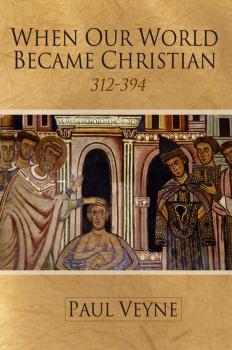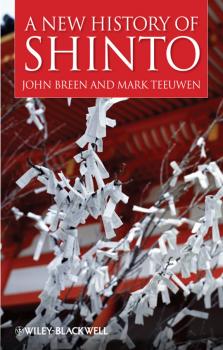Зарубежная эзотерическая и религиозная литература
Различные книги в жанре Зарубежная эзотерическая и религиозная литератураWhen Our World Became Christian. 312 - 394
This short book by one of France's leading historians deals with a big question: how was it that Christianity, that masterpiece of religious invention, managed, between 300 and 400 AD, to impose itself upon the whole of the Western world? In his erudite and inimitable way, Paul Veyne suggests three possible explanations. Was it because a Roman emperor, Constantine, who was master of the Western world at the time, became a sincere convert to Christianity and set out to Christianize the whole world in order to save it? Or was it because, as a great emperor, Constantine needed a great religion, and in comparison to the pagan gods, Christianity, despite being a minority sect, was an avant-garde religion unlike anything seen before? Or was it because Constantine limited himself to helping the Christians set up their Church, a network of bishoprics that covered the vast Roman Empire, and that gradually and with little overt resistance the pagan masses embraced Christianity as their own religion? In the course of deciding between these explanations Paul Veyne sheds fresh light on one of the most profound transformations that shaped the modern world – the Christianization of the West. A bestseller in France, this book will appeal to a wide readership interested in history, religion and the rise of the modern world.
Exploring Postcolonial Biblical Criticism. History, Method, Practice
Exploring Postcolonial Biblical Criticism: History, Method, Practice offers a concise and multifaceted overview of the origins, development, and application of postcolonial criticism to biblical studies.? Offers a concise and accessible introduction to postcolonial biblical studies Provides a comprehensive overview of postcolonial studies by one of the field's most prominent figures Explains one of the most innovative and important developments in modern biblical studies Accessible enough to appeal to general readers interested in religion
Religio Duplex. How the Enlightenment Reinvented Egyptian Religion
In this important new book, the distinguished Egyptologist Jan Assmann provides a masterful overview of a crucial theme in the religious history of the West – that of 'religio duplex', or dual religion. He begins by returning to the theology of the Ancient Egyptians, who set out to present their culture as divided between the popular and the elite. By examining their beliefs, he argues, we can distinguish the two faces of ancient religions more generally: the outer face (that of the official religion) and the inner face (encompassing the mysterious nature of religious experience). Assmann explains that the Early Modern period witnessed the birth of the idea of dual religion with, on the one hand, the religion of reason and, on the other, that of revelation. This concept gained new significance in the Enlightenment when the dual structure of religion was transposed onto the individual. This meant that man now owed his allegiance not only to his native religion, but also to a universal 'religion of mankind'. In fact, argues Assmann, religion can now only hold a place in our globalized world in this way, as a religion that understands itself as one among many and has learned to see itself through the eyes of the other. This bold and wide-ranging book will be essential reading for historians, theologians and anyone interested in the nature of religion and its role in the shaping of the modern world.
A New History of Shinto
This accessible guide to the development of Japan’s indigenous religion from ancient times to the present day offers an illuminating introduction to the myths, sites and rituals of kami worship, and their role in Shinto’s enduring religious identity. Offers a unique new approach to Shinto history that combines critical analysis with original research Examines key evolutionary moments in the long history of Shinto, including the Meiji Revolution of 1868, and provides the first critical history in English or Japanese of the Hie shrine, one of the most important in all Japan Traces the development of various shrines, myths, and rituals through history as uniquely diverse phenomena, exploring how and when they merged into the modern notion of Shinto that exists in Japan today Challenges the historic stereotype of Shinto as the unchanging, all-defining core of Japanese culture
The Blackwell Companion to Nineteenth-Century Theology
Bringing together a collection of essays by prominent scholars, The Blackwell Companion to Nineteenth Century Theology presents a comprehensive account of the most significant theological figures, movements, and developments of thought that emerged in Europe and America during the nineteenth century. Representing the most up-to-date theological research, this new reference work offers an engaging and illuminating overview of a period whose forceful ideas continue to live on in contemporary theology A new reference work providing a comprehensive account of the most significant theological figures and developments of thought that emerged in Europe and America during the nineteenth century Brings together newly-commissioned research from prominent international Biblical scholars, historians, and theologians, covering the key thinkers, confessional traditions, and major religious movements of the period Ensures a balanced, ecumenical viewpoint, with essays covering Catholic, Russian, and Protestant theologies Includes analysis of such prominent thinkers as Kant and Kierkegaard, the influence and authority of Darwin and the natural sciences on theology, and debates the role and enduring influence of the nineteenth century “anti-theologians”
After Enlightenment. The Post-Secular Vision of J. G. Hamann
After Enlightenment: Hamann as Post-Secular Visionary is a comprehensive introduction to the life and works of eighteenth-century German philosopher, J. G. Hamann, the founding father of what has come to be known as Radical Orthodoxy. Provides a long-overdue, comprehensive introduction to Haman's fascinating life and controversial works, including his role as a friend and critic of Kant and some of the most renowned German intellectuals of the age Features substantial new translations of the most important passages from across Hamann's writings, some of which have never been translated into English Examines Hamann's highly original views on a range of topics, including faith, reason, revelation, Christianity, biblical exegesis, Socrates, theological aesthetics, language, sexuality, religion, politics, and the relationship between Judaism and Christianity Presents Hamann as the 'founding father' of a distinctly post-modern, post-secular theology and, as such, as an alternative to the 'postmodern triumvirate' of Nietzsche, Heidegger, and Derrida Considers Hamann's work as a touchtone of modern Jewish-Christian dialogue, in view of debates with his friend Moses Mendelssohn Explores Hamann's role as the visionary founder of a 'metacritical' movement that radically calls into question the basic principles of modern secular reason, and thus reprises the debate between those defending Hamann's views and those labeling him the bête noir of the Enlightenment
Historical Theology. An Introduction to the History of Christian Thought
Freshly updated for this second edition with considerable new material, this authoritative introduction to the history of Christian theology covers its development from the beginnings of the Patristic period just decades after Jesus's ministry, through to contemporary theological trends. A substantially updated new edition of this popular textbook exploring the entire history of Christian thought, written by the bestselling author and internationally-renowned theologian Features additional coverage of orthodox theology, the Holy Spirit, and medieval mysticism, alongside new sections on liberation, feminist, and Latino theologies, and on the global spread of Christianity Accessibly structured into four sections covering the Patristic period, the Middle Ages and Renaissance, the reformation and post-reformation eras, and the modern period spanning 1750 to the present day, addressing the key issues and people in each Includes case studies and primary readings at the end of each section, alongside comprehensive glossaries of key theologians, developments, and terminology Supported by additional resources available on publication at www.wiley.com/go/mcgrath
Rethinking Christian Identity. Doctrine and Discipleship
Recent decades have seen major shifts in our understanding of Christian identity. This timely book explores contemporary theological theory in asking what makes a Christian in the twenty-first century. Engages with developments in contemporary theological thought, assessing the work of leading figures Rowan Williams, John Milbank, and Kathryn Tanner Challenges accepted ideas of Christian identity by revealing largely unexplored perspectives on how sin affects its formation Contributes to vexed debates about Christian identity at a time when Christianity is expanding in some regions, yet in decline in many parts of the Western world
The Religion Toolkit. A Complete Guide to Religious Studies
This complete overview of religious studies provides students with the essential knowledge and tools they need to explore and understand the nature of religion. Covers the early development of religion, with overviews of major and minor religions from Islam to Scientology Considers recent developments including secularization; the relationship between religion and science; and scientific studies on religion, health, and mystical experience Uses humor throughout, allowing students to remain open-minded to the subject Explains what it means to study religion academically, and considers the impact of the study of religion on religion itself Contains numerous student-friendly features including photos, maps, time lines, side bars, historical profiles, and population distribution figures Provides classroom users with a lively website,www.wiley.com/go/religiontoolkit, including questions, quizzes, extra material, and helpful primary and secondary sources
The Wiley-Blackwell Companion to Religion and Social Justice
The Wiley-Blackwell Companion to Religion and Social Justice brings together a team of distinguished scholars to provide a comprehensive and comparative account of social justice in the major religious traditions. The first publication to offer a comparative study of social justice for each of the major world religions, exploring viewpoints within Christianity, Islam, Judaism, Hinduism, Buddhism, and Confucianism Offers a unique and enlightening volume for those studying religion and social justice – a crucially important subject within the history of religion, and a significant area of academic study in the field Brings together the beliefs of individual traditions in a comprehensive, explanatory, and informative style All essays are newly-commissioned and written by eminent scholars in the field Benefits from a distinctive four-part organization, with sections on major religions; religious movements and themes; indigenous people; and issues of social justice, from colonialism to civil rights, and AIDS through to environmental concerns









